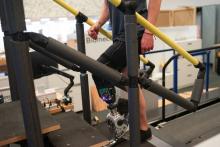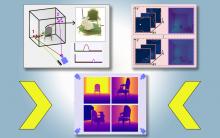Research Stories
 |
Helping robots zero in on the objects that matter |
A new method called Clio enables robots to quickly map a scene and identify the items they need to complete a given set of tasks. |
 |
Startup’s displays engineer light to create immersive experiences without the headsets |
“We are adding a new layer of control between the world of computers and what your eyes see,” says Barmak Heshmat, co-founder of Brelyon and a former MIT postdoc. |
 |
Researchers return to Arctic to test integrated sensor nodes |
The nodes are intended to become part of a widespread sea-ice monitoring network. |
 |
Implantable microphone could lead to fully internal cochlear implants |
This tiny, biocompatible sensor may overcome one of the biggest hurdles that prevent the devices from being completely implanted. |
 |
A prosthesis driven by the nervous system helps people with amputation walk naturally |
A new surgical procedure gives people more neural feedback from their residual limb. With it, seven patients walked more naturally and navigated obstacles. |
 |
Researchers leverage shadows to model 3D scenes, including objects blocked from view |
This technique could lead to safer autonomous vehicles, more efficient AR/VR headsets, or faster warehouse robots. |
 |
Microscope system sharpens scientists’ view of neural circuit connections |
A newly described technology improves the clarity and speed of using two-photon microscopy to image synapses in the living brain. |
 |
Technologies enable 3D imaging of whole human brain hemispheres at subcellular resolution |
Three innovations by an MIT-based team enable high-resolution, high-throughput imaging of human brain tissue at a full range of scales, and mapping connectivity of neurons at single-cell resolution. |
 |
A new way to spot life-threatening infections in cancer patients |
Leuko, founded by a research team at MIT, is giving doctors a noninvasive way to monitor cancer patients’ health during chemotherapy — no blood tests needed. |
 |
With programmable pixels, novel sensor improves imaging of neural activity |
New camera chip design allows for optimizing each pixel’s timing to maximize signal-to-noise ratio when tracking real-time visual indicator of neural voltage. |
- ‹ previous
- 3 of 64
- next ›

